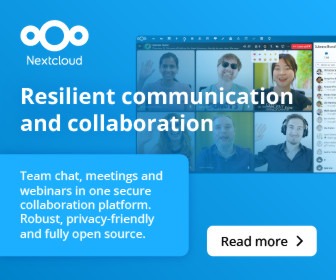FOSS Week in Review
Bookstores say “no” to Kindle
 What a surprise! Bookstores don’t want to sell Kindles.
What a surprise! Bookstores don’t want to sell Kindles.
It seems that Amazon has come up with a scheme, called Amazon Source, to let independent bookstores sell Kindle e-book readers and get a small commission on e-book sales to those readers for two years. This innitiave is being pushed in the U.S. first and might be offered in other countries at a later date. When announcing the initiative last week, Amazon said, “With Amazon Source, customers don’t have to choose between e-books and their favourite neighbourhood bookstore – they can have both.”
This led Dustin Kurtz, marketing manager with the New York publishing firm Melville House, to proclaim on the company’s website, “Amazon did a good thing on Wednesday: they made me and indie booksellers around the country laugh.”
In the article, Kurtz collected comments from some U.S. based independent booksellers. We’ll share a few, like this observation from Carole Horne with the Harvard Book Store:
“Hmmm, let’s see. We sell Kindles for essentially no profit, the new Kindle customer is in our store where they can browse and discover books, the new Kindle customer can then check the price on Amazon and order the ebook. We make a little on their ebook purchases, but then lose them as a customer completely after two years. Doesn’t sound like such a great partnership to me.”
Kris Kleindienst with Left Bank Books in Missouri offered Amazon his own counter program:
“Left Bank Books announces its new program whereby Amazon.com buys its books from us at a fifty percent markup over list price. They will also be charged shipping. We believe this will allow Amazon to be a part of the bricks and mortar experience that they can’t do without. Prior to this program Amazon was forced to make do with warehouses in tax free environments that did not leave their customers with that satisfied, ‘I supported my local economy’ feeling they increasingly want. Now with the innovative Left Bank Books program they are easily able to stay relevant in a world that demands more integrity from its retail experience.”
In Minnesota, Colin McDonald of Common Good Books wrote:
“Getting 10% of every book purchased on a Kindle is like getting to keep the autograph of a celebrity caught pissing on your lawn. For two years.”
It appears the program won’t be met with much more enthusiasm if it’s ever offered to booksellers in the UK. A report published on the BBC‘s website quotes Patrick Neale, president of the Booksellers Association and co-owner of Jaffe & Neale bookshop and cafe:
“‘I was really pleased to see that American independent bookshops were saying no thanks,’ he told the BBC.
“‘We’ve stopped and thought about it because we’re business people. But you’ve got to draw a line in the sand somewhere – they are destroying the high street.
“‘To do anything in collaboration would be wrong to our customers – it would be a very confusing message.’
He added that a more favourable e-book deal for bookshops would be directly with publishers, with various discussions of that nature currently taking place.
Getting back to the American bookstores who have been offered the Amazon deal and their responses as collected by Melville House. Our favorite came from Sarah McNally of McNally Jackson Books in New York, who exhibited quite a command of the English language when she wrote:
“They can go fuck themselves.”
Hemingway said the best writing consisted of short declarative sentences.
GIMP drops SourceForge
Anyone who’s been hiding behind a rock possibly doesn’t know about the big brouhaha over at GIMP this week. It seems that the premiere free photo manipulation program has dropped SourceForge as its host. The reason for the move was explained in a posting on the GIMP’s website:
SourceForge, once a useful and trustworthy place to develop and host FLOSS applications, has faced a problem with the ads they allow on their sites – the green “Download here” buttons that appear on many, many adds leading to all kinds of unwanted utilities have been spotted there as well.
The tipping point was the introduction of their own SourceForge Installer software, which bundles third-party offers with Free Software packages. We do not want to support this kind of behavior, and have thus decided to abandon SourceForge.
So far there seems to be a lot of support for this move from within the FOSS community, with some predicting that other projects may soon follow GIMP’s lead.
Half of Internet traffic comes from Netflix and YouTube
If a report from Canadian Internet monitoring firm Sandvine quoted by Mashable is to be believed, fully half of the traffic on the Internet in North America comes from Netflix and YouTube.
According to the report, Netflix is the most bandwidth hungry, accounting for 31.6% of all downstream traffic in North America. YouTube isn’t a slacker, however, with 18.7%, which is up from 9% at the beginning of the year. This means that together the two sites represent slightly more than half of online traffic. BitTorrent, which just five years ago was the leader with 31%, now accounts for only 4% of downstream traffic. At its peak, BitTorrent represented over 60% of downstream traffic.
Taiwan animators take on Rockstar Consortium
Last Friday, Techdirt passed-on this really cool video from Taiwanese animation firm Next Media Animation which seeks to explain patent trolls in general and Rockstar Consortium in particular. Oh yes, it also makes a pitch for a donation to EFF. Watch it. You’ll like it. Donate if you desire and are able.
EFF files accounts on chilling effects of NSA
The Electronic Frontier Foundation (EFF) has asked the U.S. District Court for the Northern District of California to review evidence that the NSA’s “Associational Tracking Program” is both unconstitutional and that it’s not authorized under Section 215 of the Patriot Act which the government has been using as justification of NSA practices. The EFF also provided the court with testimony from 22 separate organizations that detail how the NSA’s program of collecting telephone records is hampering their operations.
“In First Unitarian Church of Los Angeles v. NSA, EFF represents a diverse array of environmentalists, gun-rights activists, religious groups, human-rights workers, drug-policy advocates and others that share one major commonality: they each depend on the First Amendment’s guarantee of free association. EFF argues that if the government vacuums up the records of every phone call—who made the call, who received the call, when and how long the parties spoke—then people will be afraid to join or engage with organizations that may have dissenting views on political issues of the day. The US government acknowledged the existence of the telephone records collection program this summer, after whistleblower Edward Snowden leaked a copy of a Foreign Intelligence Surveillance Court order authorizing the mass collection of Verizon telephone records.
“‘The plaintiffs, like countless other associations across the country, have suffered real and concrete harm because they have lost the ability to assure their constituents that the fact of their telephone communications between them will be kept confidential from the federal government,’ EFF Senior Staff Attorney David Greene said. ‘This has caused constituents to reduce their calling. This is exactly the type of chilling effect on the freedom of association that the First Amendment forbids.'”
Section 215 of the Patriot Act only allows the government to collect information that “is relevant to an authorized investigation.”
Is DRM coming to your car?
It’s looking as if digital rights management isn’t just for music and movies anymore. It might be coming soon to the car in your garage.
Karsten Gerloff has reported on his blog that French car maker Renault has now added DRM to it’s electric Zoe offering:
“When you buy a Renault Zoe, the battery isn’t included. Instead, you sign a rental contract for the battery with the car maker. In a Zoe owner’s forum, user Franko30 reports that the contract contains a clause giving Renault the right to prevent your battery from charging at the end of the rental period. According to an article in Der Spiegel, the company may also do this when you fall behind on paying the rent for the battery.
“This means that Renault has some way of remotely controlling the battery charging process. According to the Spiegel article, the Zoe (and most or all other electric cars) collect reams of data on how you use them, and send this data off to the manufacturer without your knowledge. This data tells the company where you are going, when, and how fast, where you charge the battery, and many other things besides. We already knew that Tesla was doing this with its cars since the company’s very public spat with a journalist who reviewed one of their cars for the New York Times. Seeing the same thing in a mass market manufacturer like Renault makes clear just how dangerous this trend is.”
Dangerous indeed. We can see the day coming when your auto insurance company will have information not only on your daily driving habits but will be notified if you drive to a city with high accident or auto theft rates for the purpose or raising premiums.
Another day, another phone call recorded by the NSA… Until next week, may the FOSS be with you…
















On the first part of this article…I would have to applaud the last Bookstore owner’s comments! While I love books and sometimes I find the prices on Amazon feasible…I make it a point to ALWAYS check my local bookstore for the title Im searching for FIRST! Only because I’ve always grown up with an actual book in my hands…not an e-pub..and a Kindle….which while its a great idea…I don’t relish having to attach my reading with the life-span of my battery charging! But that’s just me! As for the SourceForge issue, I would agree with GIMP, it’s not something you want to be associated with, pop-ups, “free-ware” and ads…..not a good look for an Open Source project of any kind. And finally with the NSA issue, well one option is to do things “internationally” where you host and provide services, features and applications overseas alleviating the fines, and heavy-handed tactics by the government….